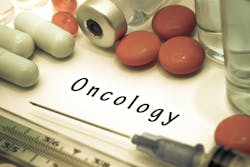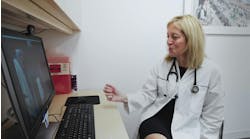The Association of Community Cancer Centers (ACCC) has recognized five oncology programs for innovations ranging from remote patient monitoring and improving oral oncolytic compliance to addressing social determinants of health.
Founded in 1974, ACCC is a network of 28,000 multidisciplinary practitioners from 2,100 hospitals and practices nationwide. The five winners of the 2022 ACCC Innovator Awards each delivered a presentation to their oncology care colleagues from across the country, gathering this week at the ACCC 39th National Oncology Conference.
ACCC said that winners are selected based on the potential of their program to have a real-world impact on the delivery of cost-effective, patient-centered care with replicable solutions in the areas of care coordination and quality improvement, technology, patient engagement, innovative training and staffing models, the provision of supportive care services, among many other areas of focus.
In a statement, David Penberthy, M.D., M.B.A., ACCC president, and medical director, radiation oncology at Bon Secours Southside Medical Center, explained the significance of the awards program: “The ACCC Innovator Awards were founded more than a decade ago to not only recognize our colleagues who are bringing their brightest ideas to advance cancer care delivery, but to also provide an opportunity to learn from each other and replicate these programs in cancer programs and practices across the country.”
The ACCC 2022 Innovator Award Winners:
Deploying Technology Across an Interdisciplinary Team to Improve Oral Oncolytic Compliance
Baptist Health’s Miami Cancer Institute, Miami, Florida
This cross-departmental team of clinic nurses, nurse navigators, pharmacists, and pharmacist technicians partnered to evaluate existing processes and leverage technology to improve compliance to oral oncolytic education, consent, and adherence standards. Readily available technology like Zoom and Cisco Jabber supported patient education, DocuSign allowed digital signatures, and Microsoft Teams facilitated ongoing review of oral oncolytic prescriptions. After this quality improvement initiative, oral oncolytic education and consent compliance increased from 60 percent on initial audit to 100 percent, with 90 percent occurring on same day the oral oncolytic was prescribed.
A Model for Embedding Primary Care in Oncology
ChristianaCare Health System, Helen F. Graham Cancer Center & Research Institute, Newark, Delaware
This person-centered model of care embeds a primary care provider (PCP) in the cancer clinic to see patients with comorbidities who are in active treatment and who report having no PCP. In the first six months of this pilot, oncologists referred more than 70 patients to this nurse practitioner (NP). When patients complete active treatment, the NP can connect them with a PCP outside the cancer clinic to help support their transition to survivorship care. This interdepartmental collaboration between the oncology service line and the department of family medicine reaped across-the-board benefits, including improved patient access and care coordination, decreased levels of patient stress, the ability to quickly and efficiently address comorbidities and other health concerns, and a reduction in treatment delays.
Chemotherapy Care Companion: A Remote Patient Monitoring Program
Ochsner Health, Ochsner Cancer Institute, New Orleans, Louisiana
Upon receipt of a completed Chemotherapy Care Companion consent questionnaire sent via an online patient portal app, patients receive an iHealth digital scale, blood pressure cuff, and ear thermometer free of charge and are assigned a series of daily tasks with automatic push notification reminders for completion in their patient portal app, including daily symptom survey, weight entry, temperature entry, AM/PM blood pressure, and heart rate reading. Vital signs are uploaded automatically from the integrated Bluetooth devices to the patient portal and into the EHR. From January 2020 through December 2021, 284 enrollments occurred with 50 percent being Stage 4 patients. Ages ranged from 23 to 86 years old with a compliance rate of 67 percent, which indicated that patients successfully completed more than 50 percent of their daily vitals and questionnaire tasks. Preliminary data shows that Chemotherapy Care Companion reduced the total number of ED visits and admissions by 33 percent.
Expediting Cancer Treatment Through a Rapid Access APP-Led Diagnostic Clinic
Arthur G. James Cancer Hospital and Richard J. Solove Research Institute (OSUCCC – James),
Columbus, Ohio
In response to data that showed a significant decrease in both the volume of cancer screening tests and the number of cancer diagnoses, the James Cancer Diagnostic Center decided to provide patients with direct, expedited access to diagnostic testing. Open five days a week for same or next day in-person or virtual appointments, this advanced practice provider-led center provides a novel “front door” to the cancer hospital. To date more than 600 patients have been seen in this center, with 40 percent being referred onto a sub-specialty provider, offering a unique opportunity to extend diagnostic services from the inpatient to the outpatient setting.
Addressing Social Determinants of Health through a Medical-Legal Partnership
Virginia Commonwealth University Health System, VCU Massey Cancer Center, Richmond, Virginia
This collaboration of legal and healthcare professionals helps patients with cancer resolve social and environmental factors that contribute to health disparities and which have a remedy in civil law. Through this program, the cancer center partners with a nonprofit organization that connects low-income patients with cancer to pro bono legal services, as well as financial counseling and community resources. Learn how embedding lawyers in a healthcare setting can directly resolve specific problems for individual patients; help clinical and non-clinical staff navigate health system and policy barriers; and transform institutional practices. More than 90 percent of patients using this program report that this assistance allowed them to focus more time and energy on their health.


